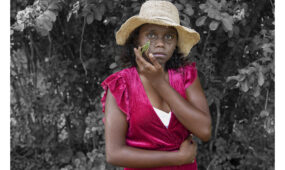The devil’s in the detail: how will the $250m arts package help SA?
InReview
South Australia’s arts and entertainment sector says the Federal Government’s $250 million COVID-19 package is a positive step, but there are concerns about whether it will help independent artists and smaller organisations.

“I think it’s very much on the low side of what people were asking for,” said Arts Industry Council of SA (AICSA) chair Gail Kovatseff, when asked if the funding package is enough to help the beleaguered arts industry.
“It’s good the Government has reached out to the sector with this package but it doesn’t seem to be reaching into the breadth of the industry … it was probably an opportunity not just to address COVID-19, but to look to the future, and this package doesn’t really do that.”
The package includes $35 million earmarked to support “significant” Commonwealth-funded arts and culture organisations, $90 million in concessional loans to help new productions, $75 million towards new festivals, concerts and other events, and $50 million to kickstart film and TV production.
There has been criticism from some in the sector that it preferences large events, organisations and screen production, and offers little immediate support for arts and entertainment workers who are ineligible for JobKeeper.
Kovatseff said that without more detail of the spending criteria, it was unclear how or if the money would filter down to help independent artists and small and medium organisations.
“It’s at the small to medium sector where Australian artists are primarily employed, so it’s critical.
“It’s where opportunities exist for independent artists, it’s where new Australian work is made… this package also isn’t clear how it services the visual arts and crafts community.”
Earlier this week AICSA asked the State Government to invest a further $10 million in the survival and recovery of the sector, saying it was facing a “major crisis” due to the COVID-19 shutdown. Kovatseff said additional state funding might complement the federal package if it didn’t reach all areas of the sector.
The Adelaide Festival Centre, which has been closed to the public since March 17 due to the pandemic restrictions, is also keen to find out more detail about how the federal funding might help South Australia.
“While the $250 million federal package is a positive step in recognising the recent difficulties faced by the arts and entertainment sector, we are keen to learn more about how the scheme specifically impacts Adelaide Festival Centre, our festivals, artists, employees and other local arts organisations,” a spokesperson told InDaily.
“We especially welcome the $90 million in low-interest loans for producers of new productions, as this will help get large-scale shows back up and running and into our venues.
“This is essential for the operation of our business and providing employment opportunities across the sector.”
SA Film Corporation CEO Kate Croser told InDaily the allocation of $50 million to support Australian film and television production would help kickstart screen production in the state.
A major barrier for screen producers is that they have been unable to access insurance due to COVID-19. Croser said the new funding – to be administered by Screen Australia – should address this problem and enable finance to flow.
“The fact that we now look like having a solution to the insurance hurdle is fantastic news.”
It’s hoped the funding may also help offset the additional costs incurred in providing a COVID-safe workplace, such as the need to recast roles due to the unavailability of international actors, the costs of having to quarantine actors and crew, and longer filming schedules due to social distancing requirements.
“The South Australian Film Corporation has been working with producers of productions we have committed funding to, to help them address their needs,” Croser said.
Two major movies set to be filmed in SA that have had their production schedules affected by the pandemic are crime thriller The Unknown Man, starring Joel Edgerton, and Run Rabbit Run, written by Adelaide-born author Hannah Kent and starring Elizabeth Moss.
Croser said she was hopeful both projects would now get into production by the end of the year.
Festivals in a post-COVID world
Meanwhile, a new report released yesterday suggests South Australia needs to rethink its arts festival strategy and do more to promote “cultural tourism”
The report, by the University of SA’s Professor Ruth Rentschler and Dr Boram Lee, says arts festivals in the post-COVID world will need to be “smart and slow, engaging with audiences to build a relationship rather than seeking volume, with an increasing focus on health, well-being and digital streaming”.

Get InReview in your inbox – free each Saturday. Local arts and culture – covered.
Thanks for signing up to the InReview newsletter.
The researchers found there was plenty of opportunity to continue growing the sector, and make a number of proposals to “redress some problem areas of the past”.
Their recommendations include greater collaboration between arts festival organisers, arts agencies and tourism agencies, and a “total reboot” of how the arts scene is represented in SA tourism promotion.
“Across Australia, cultural tourists travel further, stay longer and spend more than other tourists, with more cultural tourists attending the arts than wineries and sport, so this is a strong market to capitalise on for South Australia,” Prof Rentschler said.
“In the past, as a state, we haven’t done as much as we could to promote cultural tourism, so there is a real opportunity to grow that area, especially given domestic tourism is likely to see a major upswing while international tourism remains restricted.”
Support local arts journalism
Your support will help us continue the important work of InReview in publishing free professional journalism that celebrates, interrogates and amplifies arts and culture in South Australia.
Donate Here




